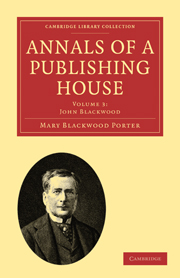Book contents
- Frontmatter
- INTRODUCTION
- Contents
- PLATES
- CHAPTER I EARLY LIFE OF JOHN BLACKWOOD
- CHAPTER II GEORGE ELIOT'S EARLY NOVELS
- CHAPTER III EDINBURGH AND LONDON
- CHAPTER IV A. W. KINGLAKE AND ‘THE INVASION OF THE CRIMEA.’
- CHAPTER V LAURENCE OLIPHANT
- CHAPTER VI THE EDITORIAL SANCTUM
- CHAPTER VII STRATHTYRUM
- CHAPTER VIII CHARLES LEVER
- CHAPTER IX “THE MILITARY STAFF OF BLACKWOOD.”
- CHAPTER X THE EDITOR ABROAD
- CHAPTER XI MRS OLIPHANT AND NEW RECRUITS
- CHAPTER XII GEORGE ELIOT'S LATER WORKS
- CHAPTER XIII LAST YEARS
- INDEX
- Plate section
CHAPTER IX - “THE MILITARY STAFF OF BLACKWOOD.”
Published online by Cambridge University Press: 05 November 2011
- Frontmatter
- INTRODUCTION
- Contents
- PLATES
- CHAPTER I EARLY LIFE OF JOHN BLACKWOOD
- CHAPTER II GEORGE ELIOT'S EARLY NOVELS
- CHAPTER III EDINBURGH AND LONDON
- CHAPTER IV A. W. KINGLAKE AND ‘THE INVASION OF THE CRIMEA.’
- CHAPTER V LAURENCE OLIPHANT
- CHAPTER VI THE EDITORIAL SANCTUM
- CHAPTER VII STRATHTYRUM
- CHAPTER VIII CHARLES LEVER
- CHAPTER IX “THE MILITARY STAFF OF BLACKWOOD.”
- CHAPTER X THE EDITOR ABROAD
- CHAPTER XI MRS OLIPHANT AND NEW RECRUITS
- CHAPTER XII GEORGE ELIOT'S LATER WORKS
- CHAPTER XIII LAST YEARS
- INDEX
- Plate section
Summary
Around the name of Sir Edward Hamley centres the interest which attaches to what John Blackwood used to call “The Military Staff of Blackwood.” This soldierly contingent, which was for the time forsaking the sword for the pen, formed a very important element amongst the contributors, and was one in which the Editor took special pride and pleasure. Military matters did not by any means always occupy their writings. Such men as the brothers Hamley, Colonel Lockhart, Sir George Chesney, and Colonel Conder of the Palestine Exploration Fund, wrote equally well on matters of general interest or fiction. So many other distinguished names occur in connection with this branch that we feel disposed to group them together, adding those who write on purely military topics, such as Sir Garnet Wolseley (the Commander in-Chief), Sir Archibald Alison (son of the historian), Sir Patrick Macdougall, Sir John Adye, Sir D. Lysons, Colonel Charles Chesney, Sir Henry Brackenbury, Colonel Henry Knollys, and Sir Herbert Kitchener; and though he belongs to an older generation, there must be here mentioned Sir Hope Grant, a dear old friend and golfing companion of my father, who in his old age memorialised his gallant fellow-countryman Sir Colin Campbell in the ‘History of the Sepoy War.’
In the second volume of these Annals we have an account of Hamley's early writings,—his novel, and the diaries he sent from the Crimea.
- Type
- Chapter
- Information
- Annals of a Publishing House , pp. 266 - 303Publisher: Cambridge University PressPrint publication year: 2010First published in: 1898



